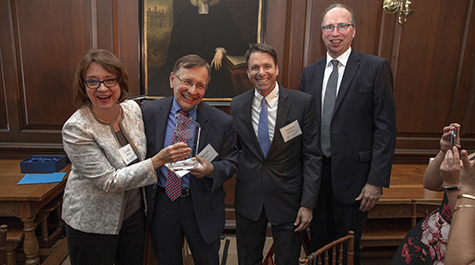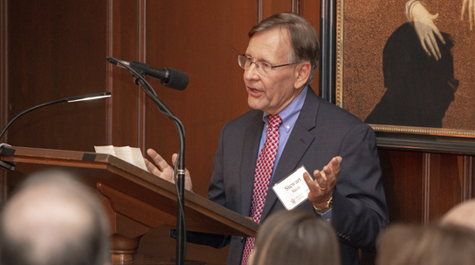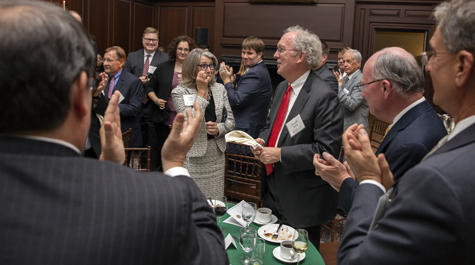Professor Stewart E. Sterk awarded annual Brigham-Kanner Property Rights Prize
“One of the most complete scholars.”
That’s how Professor Stewart E. Sterk of the Benjamin N. Cardozo School of Law was described during the opening dinner of William & Mary Law School’s annual Brigham-Kanner Property Rights Conference on Thursday, Oct. 4, in Williamsburg, Va.
Now in its 15th year, the conference brings together members of the bench, bar and academia to explore recent developments in the law that affect property rights.
Sterk was on hand to receive the 2018 Brigham-Kanner Property Rights Prize from the William & Mary Law School Property Rights Project. The prize is named in honor of the lifetime contributions to property rights of Toby Prince Brigham, founding partner of Brigham Moore, LLP, and Gideon Kanner, professor of law emeritus at Loyola Law School in Los Angeles, and is presented annually to a scholar, practitioner or jurist whose work affirms the fundamental importance of property rights.
In referring to Sterk as “one of the most complete scholars,” Professor Lynda Butler, the Chancellor Professor of Law at William & Mary Law School and Director of the Property Rights Project, said that Sterk approached the view of property “totally and comprehensively, teaching and writing about almost every key aspect of property as an institution.”
Butler noted that in addition to writing scholarship that is rich with ideas, Sterk has won a number of teaching awards for being best professor or best 1L professor.
“But what I find most impressive are the accolades from his peers once they learned he was to receive the award,” Butler said. “One word stuck out--generous--generous as a colleague, as a coauthor, as a teacher, and as a person.”
Sterk, is the H. Bert and Ruth Mack Professor of Real Estate Law and Director of the Center for Real Estate Law & Policy at the Benjamin Cardozo School of Law of Yeshiva University in New York City. He is a thoughtful and prolific scholar whose work spans a wide variety of areas, ranging from property and land use regulation to trusts and estates, copyright and the conflict of laws.
A member of the American Law Institute, Sterk served as an advisor in the preparation of the Restatement (Third) of Property: Servitudes. He has co–authored casebooks on trusts and estates and on land use, and he also edits the New York Real Estate Law Reporter, a monthly newsletter published with the assistance of Cardozo students.
Sterk described receiving the award as humbling. And he was grateful for the work done by the many scholars and practitioners who regularly attend the annual conference.
“The implication for those of us who are academics is to learn from those of you who are practitioners; that’s really what makes this conference particularly valuable to me,” Sterk said. “We always get an opportunity to listen to issues that are on the front lines, and it really helps us and enriches us in the work that we do, so I really thank the sponsors of this conference for making that possible.”
Sterk said that the importance of property rights is absolutely critical to the human condition. But as a scholar and teacher, he also feels it is critical for first-year law students to develop the wide-ranging skills they will need to become lawyers.
“From a teaching perspective I recognized that property was probably the most important teaching course of any one in the first year,” Sterk said. “Unlike civil procedure and torts or criminal law or maybe contracts, property is not solely focused on litigation or on policy issues; property allows a teacher of law to get people to focus on issues of negotiation, issues of counseling, issues of drafting, issues that are critical to every lawyer in the profession.”
Previous recipients of the Brigham-Kanner Property Rights Prize include Professor Frank I. Michelman of Harvard University (2004), Professor Richard Epstein of the New York University School of Law (2005), Professor James W. Ely, Jr., of Vanderbilt University (2006), Professor Margaret Jane Radin of the University of Michigan Law School (2007), Professor Robert C. Ellickson of Yale Law School (2008), Professor Richard E. Pipes of Harvard University (2009), Professor Carol Rose of the University of Arizona James E. Rogers College of Law (2010), retired Supreme Court Justice Sandra Day O’Connor (2011), Professor James E. Krier of the University of Michigan Law School (2012), Professor Thomas W. Merrill of Columbia Law School (2013), Michael M. Berger of Manatt, Phelps & Phillips (2014), Professor Joseph William Singer of Harvard Law School (2015), Hernando de Soto, President of the Institute for Liberty and Democracy (Lima, Peru) (2016), and Professor David L. Callies of the University of Hawai’i at Mānoa William S. Richardson School of Law (2017).
Papers from the conference will be published in Volume 8 (2019) of the Brigham-Kanner Property Rights Conference Journal, published by the William & Mary Law School Property Rights Project. Volume 7, The Future of Regulatory Takings, was published in August 2018.
About William & Mary Law School
Thomas Jefferson founded William & Mary Law School in 1779 to train leaders for the new nation. Now in its third century, America's oldest law school continues its historic mission of educating citizen lawyers who are prepared both to lead and to serve.





